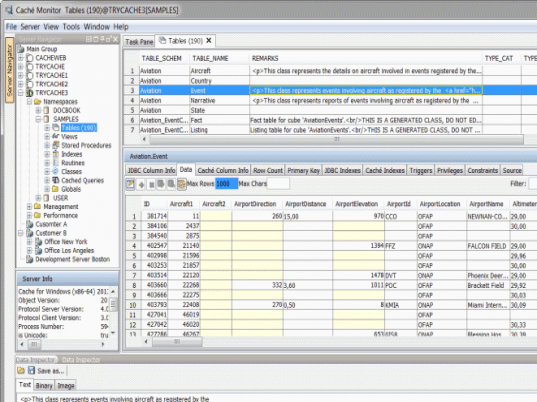Publisher's description
Cache Monitor is the SQL development tool designed for InterSystems database Cache. It supports developers with features, like: Advanced SQL Query Editor,Cache-SQL Syntax highlighting,SQL Code completion,SQL History buffer for executed SQL commands,SQL Code formatting,Graphical SQL execution plan and more.
You see the process ID (PID) from your connection on the Tabpane on every Query Analyzer. Code completion allows you to type a few characters and then display a list of context-sensitive possibilities to complete the text you are typing. Editor code completion brings up a list of Tables or Columns (also known as Intellisense). Code completion can be triggered by pressing [CTRL+SPACE] or by typing a hotchar or keyword, such as '.' or ',' in an SELECT list. After typing the keyword ON in a JOIN clause, Cache Monitor displays foreign key join suggestion
Cache-SQL formatting can executed from context menu to make your code, or the code of others, much easier to read ("Format SQL"). The also supports of course: Undo/Redo and Search and Replace.
With Hyperlink navigation you can simple navigate from the editor to Tables metadata. When you presses the CTRL key and hovers the mouse cursor over a certain code element, the element is changed to a hyperlink. When you holds the CTRL key and clicks on the hyperlink, the "go to Tables metadata" action is performed.
You see the process ID (PID) from your connection on the Tabpane on every Query Analyzer. Code completion allows you to type a few characters and then display a list of context-sensitive possibilities to complete the text you are typing. Editor code completion brings up a list of Tables or Columns (also known as Intellisense). Code completion can be triggered by pressing [CTRL+SPACE] or by typing a hotchar or keyword, such as '.' or ',' in an SELECT list. After typing the keyword ON in a JOIN clause, Cache Monitor displays foreign key join suggestion
Cache-SQL formatting can executed from context menu to make your code, or the code of others, much easier to read ("Format SQL"). The also supports of course: Undo/Redo and Search and Replace.
With Hyperlink navigation you can simple navigate from the editor to Tables metadata. When you presses the CTRL key and hovers the mouse cursor over a certain code element, the element is changed to a hyperlink. When you holds the CTRL key and clicks on the hyperlink, the "go to Tables metadata" action is performed.



User comments